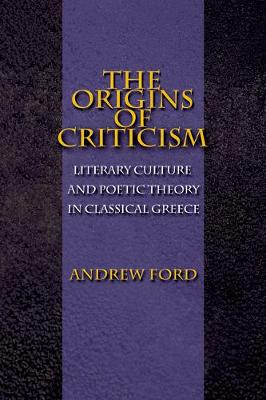By "literary criticism" we usually mean a self-conscious act involving the technical and aesthetic appraisal, by individuals, of autonomous works of art. Aristolte and Plato come to mind. The word "social" does not. Yet, as this book aims to prove, it should if we wish to understand where literary criticism as we understand it today came from. Andrew Ford offers an understanding of the development of criticism, demonstrating that its roots stretch back long before the sophists to public commentary on the performance of songs and poems in the preliterary era of Ancient Greece. He pinpoints when and how, later in the Greek tradition than is usually assumed, poetry was studied with its own principles and methods. "The Origins of Criticism" complements the usual history of ideas approach to the topic by treating criticism as a social as well as a theoretical activity. Ford considers varying scholarly interpretations of the key texts discussed.
Examining Greek discussions of poetry from the late 6th century BC through the rise of poetics in the late 4th, he asks when we can first recognise anything like the modern notions of literature as imaginative writing and of literary critism as a special knowledge of such writing.
- ISBN13 9781400825066
- Publish Date 10 January 2009 (first published 26 May 2002)
- Publish Status Active
- Publish Country US
- Imprint Princeton University Press
- Format eBook
- Pages 376
- Language English
- URL http://degruyter.com/search?f_0=isbnissn&q_0=9781400825066&searchTitles=true
